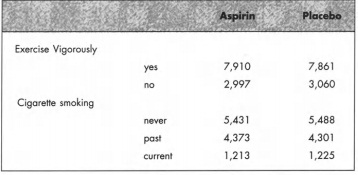Reference no: EM131400787
Does aspirin really help prevent heart attacks? During the 1980s, approximately 22,000 physicians over the age of 40 agreed to participate in a long-term health study for which one important question was to determine whether or not aspirin helps to lower the rate of heart attacks {myocardial infarctions). The treatments of this part of the study were aspirin or placebo, and the physicians were randomly assigned to one treatment or the other as they entered the study. The method of assignment was equivalent to tossing a coin and sending the physician to the aspirin arm of the study if a head appeared on the coin.
After the assignment, neither the participating physicians nor the medical personnel who treated them knew who was taking aspirin and who was taking placebo. This is called a double-blind experiment. {Why is the double blinding important in a study such as this?) The physicians were observed carefully for an extended period of time, and all heart attacks, as well as other problems, that might occur were recorded.
All of the data can be summarized on two-way tables. Other than aspirin, there are many variables that could affect the rate of heart attacks for the two groups of physicians. For example, the amount of exercise they get and whether or not they smoke are two prime examples of variables that should be controlled in the study so that the true effect of aspirin can be measured. The following table shows how the subjects (from Ref. 1) eventually divided according to exercise and to cigarette smoking.

a. Do you think the randomization scheme did a good job in controlling these variables? Explain in terms of association or lack of association.
b. Would you be concerned about the results for aspirin having been unduly influenced by the fact that most of the aspirin-takers were also nonsmokers? Explain.
c. Would you be concerned about the placebo group possibly having too many no exercisers? Explain.